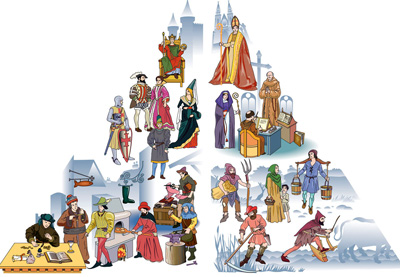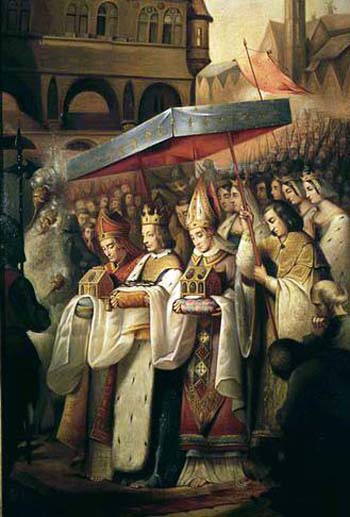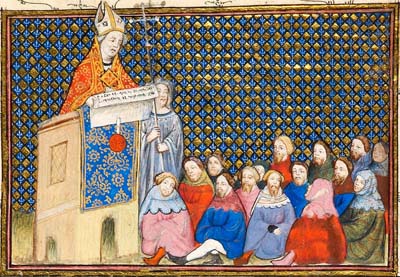 |
Organic Society
The Social Classes - II
Duties & Privileges of the Clergy
Plinio Corrêa de Oliveira
Pope Pius XII asked learned men and statesmen - as we saw in the end of the last article - to study how the different functions should be distributed in the political body to have a just and wise government.

The clergy played the role of orienting kings, nobles and the people in medieval society |
I believe that if we analyze how medieval society resolved this question, we will find important elements to help us resolve this problem today and in the future.
The basic idea that prevailed in Europe in the Middle Ages was that all men were created equal by God. They are, therefore, equal by nature. For this reason, before the State each one has the rights inherent to human nature, equal for all.
So, a man has the right to life and to own property, a certain right to individual liberty, the right to personal dignity, conditions for good health, etc. Since these rights derive from human nature, which belongs to all men, it is natural that the State must protect these rights equally for all its citizens.
It happens, however, that besides these essential rights, men also have other rights that are accidental. They are rights that originate from the accidents in each man's nature. Because of his qualities, a more intelligent or capable man, or a more industrious or virtuous man rises above the common level, and ends by acquiring more rights.
Therefore, true justice in society does not consist in treating all equally. Certainly, all should be treated in a way that assures each one the essential rights due to the human person. Then, beyond this, justice also consists in giving greater advantages and higher honors to those who bear the heavier weight of serving the public good.
From this perspective there was the generally accepted notion in the Middle Ages that two social classes should live principally to serve the common good of society. Consequently, those two classes merited a greater participation in the direction of public affairs. These classes were the clergy and the nobility.
Duties and privileges of the clergy
The first of these two classes was the clergy. It is evident that in a Catholic country the clergy should be the first class because its members received the Sacrament of Orders instituted by Our Lord Jesus Christ. This condition gives them the elements to fulfill the divine mission of distributing the graces necessary for Catholics to achieve eternal salvation through the ministry of the Sacraments.

King Louis IX, with Bishopsat his side, in a public procession to deliver relics to Sainte Chapelle |
It was the first class in honor because the priestly unction confers to the priest a human preeminence. The priest represents a bridge between men and God. For this reason, in the medieval society he was the object of particular respect; he was seen as a personification of religion itself. The priest also played a role in the State because the State was understood as an institution whose principal goal was to glorify God, not as a cooperative to oversee financial interests.
Reading the newspapers today, we see that governments are mainly concerned about importation and exportation, how to grow the treasury, how to generate internal sources of production, how to arrange trade agreements with other countries, etc. The majority of the matters dealt with today by either governments or individuals refer to the economy. This is a materialist conception of government, not that different from the Marxist conception.
Unquestionably, according to Natural Law, the State is meant to look after the temporal common good of its citizens, which includes providing them with what they need to live well, with dignity and honor. But the State is also meant to help its citizens to improve their cultural and spiritual lives. In many ways the latter is the noblest duty of the State toward its citizens.
Now, among the spiritual benefits the State can give, the most important is to promote the virtuous living of its citizens so that their temporal lives are oriented toward achieving eternal salvation.
To reach this end, the State works in its own order as a kind of complementary element to the Church. The Church teaches, governs and sanctifies souls; the State orders temporal life to make it easier for its citizens to reach their goal of eternal salvation. Since this was the perspective of the medieval man, one can understand how no class had the right to a higher preeminence than the one whose members were the propelling forces for men to achieve eternal salvation, the priestly class.

The clergy formed an elite known for its learning and virtue |
In medieval society, another factor contributed to this position of the clergy. The conditions of a priest's life naturally favored the practice of virtue. As a secondary consequence, these conditions normally led to study and acquiring knowledge. So, besides having a divine mission, the priestly class also formed an elite in society characterized by its virtue and knowledge. It constituted, therefore, an element that provided an enormous help in the good ordering of social life.
This class endured very heavy duties:
-
First, the priest renounced his own will for a higher good; when he made his vows, he was saying that he would be obedient forever to the will of another man, his superior.
- Second, a member of the clergy had to renounce making a career or fortune in order to dedicate himself entirely to the interests of the Church.
- Third, he renounced even the legitimate pleasure of constituting a family to completely give himself to the service of God.
- Fourth, he was obliged to hear confessions, having listened to every problem or sin brought to him, he then had to advise, correct, reprehend and absolve to the best of his knowledge.
These onuses made the clergy the most sacrificial class of society. It was normal that it would receive compensations. So, it also had a privileged position in the social body.
Continued

Posted June 7, 2013

  | | Prof. Plinio |
Organic Society was a theme dear to the late Prof. Plinio Corrêa de Oliveira. He addressed this topic on countless occasions during his life - at times in lectures for the formation of his disciples, at times in meetings with friends who gathered to study the social aspects and history of Christendom, at times just in passing.
Atila S. Guimarães selected excerpts of these lectures and conversations from the transcripts of tapes and his own personal notes. He translated and adapted them into articles for the TIA website. In these texts fidelity to the original ideas and words is kept as much as possible.

Related Topics of Interest
 Differentiations & Participation in Society Differentiations & Participation in Society
 The Three Orders of Medieval Society The Three Orders of Medieval Society
 How Intermediary Societies Participate in
the State Power How Intermediary Societies Participate in
the State Power
 The Perfect Societies: Church & State The Perfect Societies: Church & State
 The Organic Formation of a Region The Organic Formation of a Region
 All Classes Should Have Elites All Classes Should Have Elites
 Fostering the Originality of Each Social Cell Fostering the Originality of Each Social Cell
 The Bourgeois in Free Cities and Kingdoms The Bourgeois in Free Cities and Kingdoms
|
Organic Society |
Social-Political | Home | Books | CDs | Search | Contact Us | Donate

© 2002-
Tradition in Action, Inc. All Rights Reserved
|
 |
|